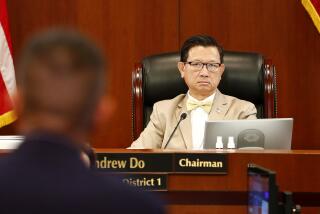Board Members Should Not Be Paid for Services
- Share via
Question: I own a community association management company in the Los Angeles area. In the last few months I have been invited to present management proposals to five associations.
These five associations have been self-managed without professional management advice. Each of these associations has been paying one or more of its board members for association services. The payments are not for reimbursement of expenses but rather a form of salary for serving in a “volunteer” position.
Some of the associations waive the monthly assessments for their board members and some have devised clever ways to avoid accounting for the missing revenue. It is possible that the other owners do not know that the board members are being paid. One of the associations pays its board members by issuing checks out of the operating funds.
I have explained to them that volunteer directors have some protection from liability because of their volunteer status and that their paying themselves jeopardizes that protection. In every case, they stated that paying the board members was the way they kept the board positions filled. They claimed to be unaware that this procedure is probably in violation of their governing documents.
One of the associations asked its attorney about paying the board members, and the attorney said it was OK.
I would appreciate your comments, since your column is a source of information and education for many community associations that don’t have the guidance of professional management.
Answer: The ideal “textbook” association is structured so the volunteer board of directors is the decision-making body. The board has the authority to delegate all administrative, accounting, property maintenance and other association responsibilities to contractors, vendors and professionals. The board has the duty to adopt a realistic budget and assessment schedule to operate the association. That is the fair way for owners to share the cost of running the association.
Almost every association is set up this way, but some boards of directors like to save money by doing the work themselves or they think that is what they are supposed to do. I have never seen an association declaration that says the condominium board members have to vacuum the halls. Board members should not feel obligated to be the unpaid accountant, attorney, janitor or handyman for the rest of the owners.
I advise board members not to perform services for the association that should be paid services. It is unfair for the other owners to expect board members to perform association services. Eventually, no one wants to serve on the board because of the time commitment and the work involved.
When board members take on responsibilities like cleaning the pool, mowing the common area lawn or performing other services, they sometimes decide they should be paid for their work or receive some secret benefit.
At that point, the director should resign from the board. Payment or any other form of remuneration to board members is not consistent with most associations’ governing documents unless the payment is reimbursement for actual expenses.
The association is a nonprofit organization, and the members (owners) are entitled to know if board members are being paid. The annual financial report, if prepared according to generally accepted accounting practices, should disclose any conflict of interest or financial dealings with volunteer directors.
Some associations have requirements in their legal documents that any member who performs paid services must have the approval of the membership. In other words, both disclosure and member approval are required.
You were correct in cautioning the boards with whom you discussed this matter. There are many legal, accounting, insurance and tax considerations.
As you point out in your letter, liability is an issue that should be discussed with the association attorney and insurance agent. The directors’ and officers’ liability insurance coverage could be affected if board members are paid, especially if the board members are aware that payment is prohibited in the association’s legal documents.
Board members have a duty to comply with the association’s documents. They are not entitled to special privileges or benefits. In my opinion, associations should not hire any owners or residents to perform paid services. When disagreements or negotiations arise, the association is better off dealing with a third party.
*
Q: Our association has been repairing party walls between adjoining units. The association’s attorney advised the board that the association was not responsible for party walls. He advised the board not to repair party walls in the future. The board agreed and changed its procedure.
One of the owners is protesting the board’s new policy. He wants his wall repaired at association expense. The board met in executive session to discuss the matter. At the next open board meeting, the president refused to tell what action the board had taken during the executive session.
Doesn’t the Davis-Stirling Act require that board decisions be made in open session? I don’t want to hire an attorney.
A: The Davis-Stirling Act says that the board can meet in executive session to discuss and act upon litigation, personnel matters, formation of contracts or enforcement hearings.
Most attorneys would probably advise the board to meet in executive session if the owner is threatening litigation. If you are not a board member, you are not entitled to see executive board meeting minutes or hear what happened in the meeting. That is the reason the executive session is a closed meeting of the board.
My advice is to be patient and let the board have time to sort this out with the association’s attorney.
It is possible that the board was discussing legal strategy and no action was taken, but members don’t have to tell you that. When the situation is resolved, you and the other owners may find out what occurred.
For now, the important thing is that the board is relying on professional legal advice, and it appears that members are complying with the association’s legal documents regarding party walls.
Jan Hickenbottom is a community association management consultant and a founding director of the California Assn. of Community Managers. She selects questions of general interest for the column and regrets that she cannot respond to all questions. Send questions to: Condo Q&A;, Box 5068, Thousand Oaks, CA 91360.
More to Read
Inside the business of entertainment
The Wide Shot brings you news, analysis and insights on everything from streaming wars to production — and what it all means for the future.
You may occasionally receive promotional content from the Los Angeles Times.










